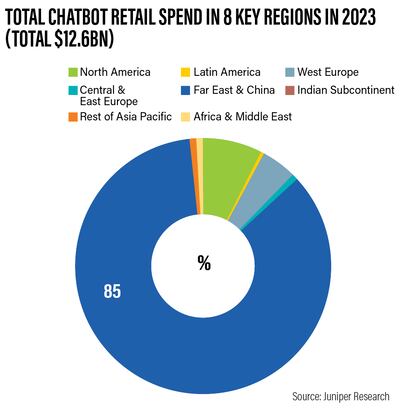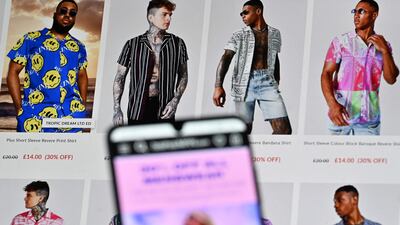Global retail spending using chatbots is projected to surge nearly sixfold to $72 billion by 2028 as more users adapt the emerging technology, a new study has found.
The 470 per cent leap in spending will be largely driven by the growth of cost-effective open language models, most notably from OpenAI's ChatGPT, Juniper Research said in a white paper released on Monday.
The Asia-Pacific region is expected to dominate the market in 2023, accounting for about 85 per cent of retail spending using chatbots this year, it said.

This will be driven by the increased reliance on messaging apps to conduct transactions, because platforms such as China's WeChat, Japan's Line and South Korea's Kakao have built strong partnerships with online retailers, the report said.
However, this would decline to 66 per cent over the next five years, as online retailers in other areas, most notably North America and Europe, begin to integrate chatbots into their activities, it said.
The resulting "high levels of confidence in chatbots as a retail channel" should prompt chatbot vendors to target online retailers in these two regions "to maximise growth outside the Asia-Pacific".
"The development of open language models will become a key driver for retail spend growth amongst small and medium retailers that were previously unable to invest in chatbots," Frederick Savage, a market data analyst at the UK-based Juniper Research, wrote in the report.
"Chatbots have historically been a low priority for omni-channel strategies owing to the high cost of training AI-based algorithms. However, ChatGPT has significantly disrupted this trend; lowering the cost of implementation of chatbots for smaller retailers."
AI has long been used by businesses in their operations, but it has gained momentum with the advent of generative AI.
The technology – made popular by ChatGPT – can produce various kinds of data, including audio, code, images, text, simulations, 3D objects and videos. ChatGPT became a sensation because of its advanced conversational capabilities.
While AI's contribution to sales is just the beginning of what the technology has to offer retailers, the majority of brand founders and marketers said improving efficiency is so far AI's "No 1 upshot right now", a recent survey from LinkedIn revealed.
The number of mobile users will also play a key role in the growth of retail over chatbots, with the number of mobile SIMs expected to grow to 10 billion in 2028, from nine billion in 2023, Juniper Research said.
This will allow users – retailers in particular – to not only communicate, but, more importantly, to tap into smart retail channels that would enhance resource and time efficiency in their business operations, it said.


